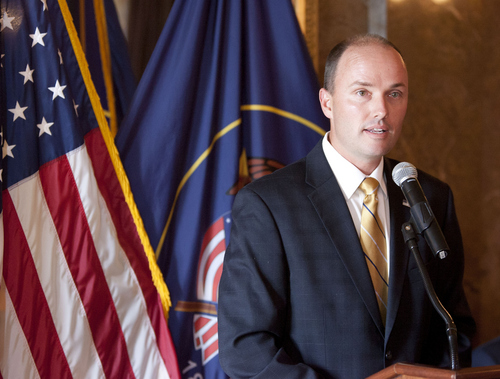This is an archived article that was published on sltrib.com in 2014, and information in the article may be outdated. It is provided only for personal research purposes and may not be reprinted.
Orem • The lieutenant governor, Utah's top elections official, gave a blunt assessment Tuesday of the state of American politics, calling it a "Dumpster fire," bemoaning the rising partisanship, lamenting the influence of money and endorsing term limits.
The problem in government, according to Lt. Gov. Spencer Cox, is politicians who are convinced their own contribution is so essential that they can't envision a scenario where they might lose. As a result, they raise huge amounts of money and vote with their next election in mind, rather than simply having the courage to take politically unpopular positions.
Cox, offering the keynote at the Ethics in Government forum at Utah Valley University, said that Americans used to be a religious people who dabbled in politics, but today politics has become a religion, with the players devout in their beliefs and unwilling to budge.
The rise in partisanship has left Congress, in particular, a dysfunctional "Dumpster fire," where nothing can get done and both sides are obsessed with raising money for the next election.
Acknowledging his view could get him run out of his own Republican Party, Cox said that "one of the biggest mistakes we've made in this country is when we decided money equals speech."
Big donations aren't necessarily repaid with favors, he said, but they do ensure special access for the donor.
The U.S. Supreme Court has dismantled many restrictions on campaign contributions, based on the argument that donations are an exercise of free speech, protected by the First Amendment.
Cox later clarified that he wasn't advocating for campaign-contribution limits and said that would drive more money into so-called "dark money" channels — nonprofit groups that are largely exempt from reporting donors.
Instead, he said, he supports some form of spending limits and potentially extending the term for members of Congress from two years to four years, so representatives don't have to spend as much of their time raising money for their next election battle.
Cox's boss, Gov. Gary Herbert, also has argued against caps on contributions and regularly takes donations of as much as $25,000. Instead of caps, Herbert argues for transparency and letting voters decide whether they approve of where candidates get their money. Cox said he agrees with the governor when it comes to disclosure.
Cox said limiting politicians' time in office could change the way they approach their jobs.
"These problems we have with people not voting their conscience and worrying about the next election would go away," he said, "if we had term limits."
Utah had term limits briefly, after the Legislature passed a law capping legislators' terms to stave off a grass-roots initiative imposing the limits. After the law passed, the ballot initiative failed and before the first group of legislators was required to leave office, the Legislature repealed the law.
Herbert said during his 2010 election that he favored term limits, but he wouldn't say how long he planned to serve as governor and has told supporters he plans to run for re-election in 2016.
Cox encouraged the students, if they don't like the current system, to get involved in politics by being outspoken and possibly running for office themselves.
"If you aren't on one of the extremes, be an extreme centrist," Cox said. "Be loud about things that are rational."
He also took a poke at Mitt Romney, his party's 2012 presidential nominee, saying the candidate suffered from not having served as a city councilman or in a role that put him closer to average people.
If he had, Cox said, "he wouldn't have kept saying really, really stupid things only rich white people say."
Twitter: @RobertGehrke



